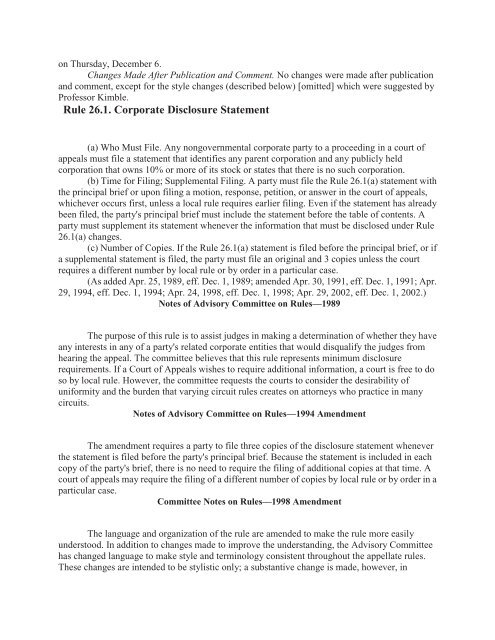Federal Rules of Appellate Procedure 2014-2015, 2014a
Federal Rules of Appellate Procedure 2014-2015, 2014a
Federal Rules of Appellate Procedure 2014-2015, 2014a
Create successful ePaper yourself
Turn your PDF publications into a flip-book with our unique Google optimized e-Paper software.
on Thursday, December 6.<br />
Changes Made After Publication and Comment. No changes were made after publication<br />
and comment, except for the style changes (described below) [omitted] which were suggested by<br />
Pr<strong>of</strong>essor Kimble.<br />
Rule 26.1. Corporate Disclosure Statement<br />
(a) Who Must File. Any nongovernmental corporate party to a proceeding in a court <strong>of</strong><br />
appeals must file a statement that identifies any parent corporation and any publicly held<br />
corporation that owns 10% or more <strong>of</strong> its stock or states that there is no such corporation.<br />
(b) Time for Filing; Supplemental Filing. A party must file the Rule 26.1(a) statement with<br />
the principal brief or upon filing a motion, response, petition, or answer in the court <strong>of</strong> appeals,<br />
whichever occurs first, unless a local rule requires earlier filing. Even if the statement has already<br />
been filed, the party's principal brief must include the statement before the table <strong>of</strong> contents. A<br />
party must supplement its statement whenever the information that must be disclosed under Rule<br />
26.1(a) changes.<br />
(c) Number <strong>of</strong> Copies. If the Rule 26.1(a) statement is filed before the principal brief, or if<br />
a supplemental statement is filed, the party must file an original and 3 copies unless the court<br />
requires a different number by local rule or by order in a particular case.<br />
(As added Apr. 25, 1989, eff. Dec. 1, 1989; amended Apr. 30, 1991, eff. Dec. 1, 1991; Apr.<br />
29, 1994, eff. Dec. 1, 1994; Apr. 24, 1998, eff. Dec. 1, 1998; Apr. 29, 2002, eff. Dec. 1, 2002.)<br />
Notes <strong>of</strong> Advisory Committee on <strong>Rules</strong>—1989<br />
The purpose <strong>of</strong> this rule is to assist judges in making a determination <strong>of</strong> whether they have<br />
any interests in any <strong>of</strong> a party's related corporate entities that would disqualify the judges from<br />
hearing the appeal. The committee believes that this rule represents minimum disclosure<br />
requirements. If a Court <strong>of</strong> Appeals wishes to require additional information, a court is free to do<br />
so by local rule. However, the committee requests the courts to consider the desirability <strong>of</strong><br />
uniformity and the burden that varying circuit rules creates on attorneys who practice in many<br />
circuits.<br />
Notes <strong>of</strong> Advisory Committee on <strong>Rules</strong>—1994 Amendment<br />
The amendment requires a party to file three copies <strong>of</strong> the disclosure statement whenever<br />
the statement is filed before the party's principal brief. Because the statement is included in each<br />
copy <strong>of</strong> the party's brief, there is no need to require the filing <strong>of</strong> additional copies at that time. A<br />
court <strong>of</strong> appeals may require the filing <strong>of</strong> a different number <strong>of</strong> copies by local rule or by order in a<br />
particular case.<br />
Committee Notes on <strong>Rules</strong>—1998 Amendment<br />
The language and organization <strong>of</strong> the rule are amended to make the rule more easily<br />
understood. In addition to changes made to improve the understanding, the Advisory Committee<br />
has changed language to make style and terminology consistent throughout the appellate rules.<br />
These changes are intended to be stylistic only; a substantive change is made, however, in


















